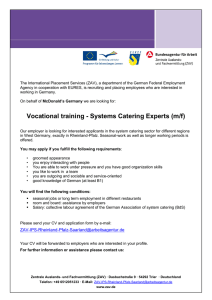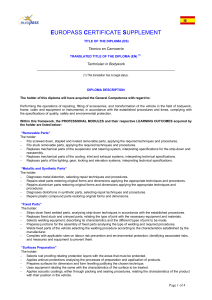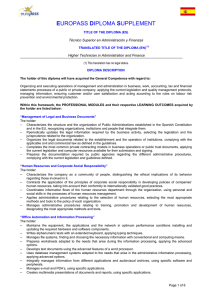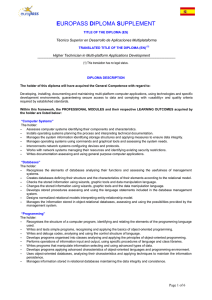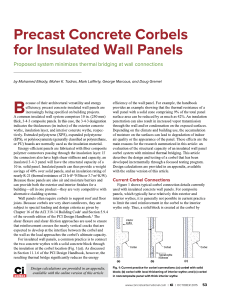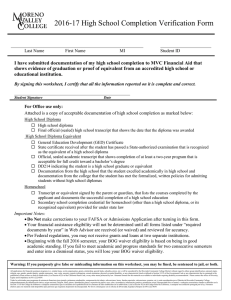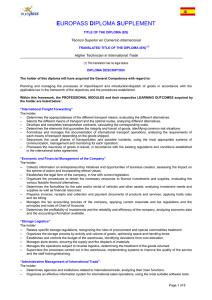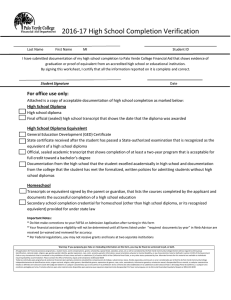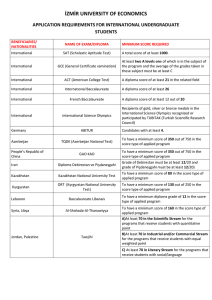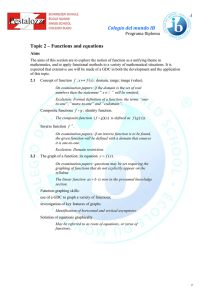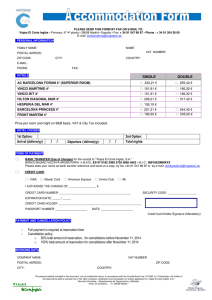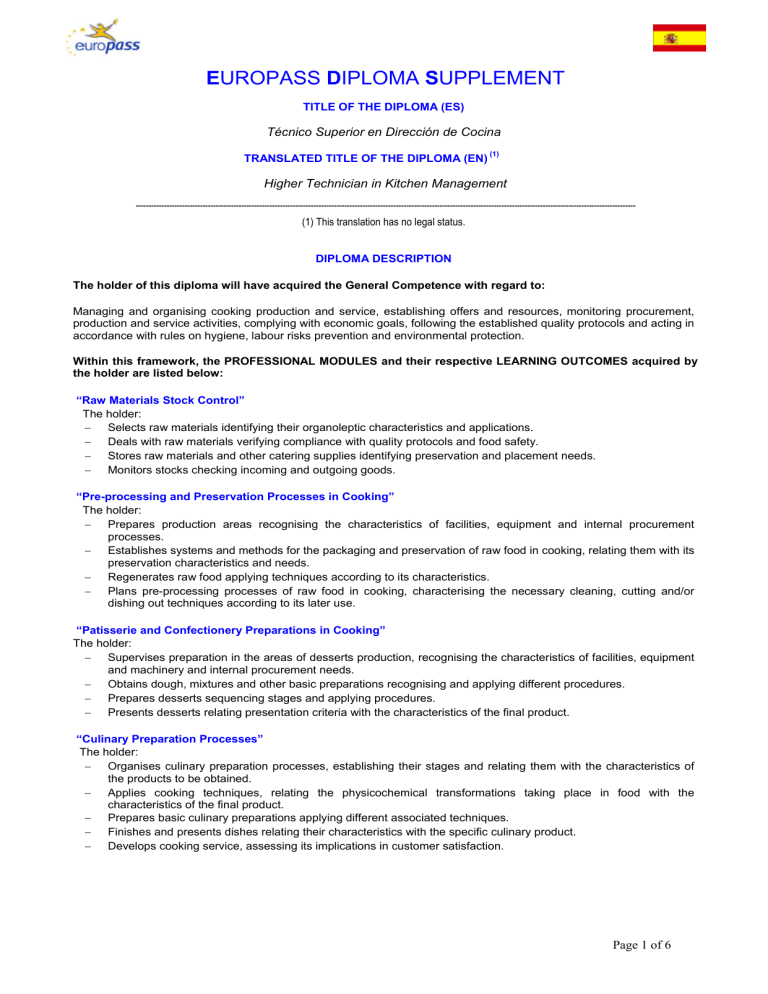
EUROPASS DIPLOMA SUPPLEMENT TITLE OF THE DIPLOMA (ES) Técnico Superior en Dirección de Cocina TRANSLATED TITLE OF THE DIPLOMA (EN) (1) Higher Technician in Kitchen Management -------------------------------------------------------------------------------------------------------------------------------------------------------------------------------------------------- (1) This translation has no legal status. DIPLOMA DESCRIPTION The holder of this diploma will have acquired the General Competence with regard to: Managing and organising cooking production and service, establishing offers and resources, monitoring procurement, production and service activities, complying with economic goals, following the established quality protocols and acting in accordance with rules on hygiene, labour risks prevention and environmental protection. Within this framework, the PROFESSIONAL MODULES and their respective LEARNING OUTCOMES acquired by the holder are listed below: “Raw Materials Stock Control” The holder: Selects raw materials identifying their organoleptic characteristics and applications. Deals with raw materials verifying compliance with quality protocols and food safety. Stores raw materials and other catering supplies identifying preservation and placement needs. Monitors stocks checking incoming and outgoing goods. “Pre-processing and Preservation Processes in Cooking” The holder: Prepares production areas recognising the characteristics of facilities, equipment and internal procurement processes. Establishes systems and methods for the packaging and preservation of raw food in cooking, relating them with its preservation characteristics and needs. Regenerates raw food applying techniques according to its characteristics. Plans pre-processing processes of raw food in cooking, characterising the necessary cleaning, cutting and/or dishing out techniques according to its later use. “Patisserie and Confectionery Preparations in Cooking” The holder: Supervises preparation in the areas of desserts production, recognising the characteristics of facilities, equipment and machinery and internal procurement needs. Obtains dough, mixtures and other basic preparations recognising and applying different procedures. Prepares desserts sequencing stages and applying procedures. Presents desserts relating presentation criteria with the characteristics of the final product. “Culinary Preparation Processes” The holder: Organises culinary preparation processes, establishing their stages and relating them with the characteristics of the products to be obtained. Applies cooking techniques, relating the physicochemical transformations taking place in food with the characteristics of the final product. Prepares basic culinary preparations applying different associated techniques. Finishes and presents dishes relating their characteristics with the specific culinary product. Develops cooking service, assessing its implications in customer satisfaction. Page 1 of 6 “Kitchen Production Management” The holder: Recognises culinary production systems identifying their characteristics and specifications. Assesses the design of areas and equipment, establishing moving and non-moving infrastructures in accordance with each production system. Schedules production and service activities in cooking, establishing and planning material and human resources. Supervises production and/or services processes in cooking monitoring all elements and variables that characterise them. Monitors stocks analysing the documentation and information needed to comply with the established budgets. “Food Quality, Safety and Hygiene Management” The holder: Identifies quality management systems characterising steps for their design and implementation. Monitors the application of quality regulations characterising measuring methods and tools. Supervises the cleaning and disinfection of tools, equipment and facilities assessing their impact on the hygienesanitary quality of products. Verifies good hygiene practices assessing hazards associated with bad hygiene habits. Applies the self-control systems based on the HACCP and traceability control, justifying associated principles. Monitors environmental management in catering establishments, recognising their benefits, as well as their implications at a health level. “Gastronomy and Nutrition” The holder: Identifies gastronomic trends analysing their principles and characteristics. Recognises the Spanish and International gastronomy, identifying the most representative products, preparations and/or traditions/habits. Identifies nutritional properties of food analysing their functions in nutrition. Applies basic dietetics principles in catering establishments, relating dietetic and nutritional properties of food with customer’s needs. “Administrative and Commercial Management in Catering” The holder: Establishes organisational structures in catering, characterising the different organisational models and objectives of the company. Controls the administrative management in areas of catering analysing documentation and its information. Monitors budgets in areas of production, recognising and establishing the structure of procurement, income and expenditure levels of his/her department or establishment. Assesses the situation of the company in relation to the market, analysing the variables of positioning and results. Prepares the marketing plan that characterises catering companies, describing its constituting elements and establishing strategies and actions. Designs gastronomic offers, characterising and selecting the elements and variables that make them up. “Human Resources and Team Leadership in Catering” The holder: Establishes job positions and their functions in the area of catering, characterising the different professional profiles. Plans human resources, applying systems of employees’ organisation. Collaborates in employee recruitment, taking into account forecasts and needs of the company. Integrates employees into the company, adapting current models of human resources organisation. Leads teams, applying human resources management techniques so as to achieve goals. “English” The holder: Recognises professional and current information contained in any type of oral discourses produced by any communication means in standard language, interpreting with precision the content of the message. Interprets professional information contained in complex written texts, analysing its contents thoroughly. Produces oral messages which are clear and structured, analysing the content of the situation and adapting the linguistic register to the listener. Writes documents and reports in relation to the specific sector or academic and daily life, relating linguistic resources with their goal. Applies professional attitudes and behaviours in communication situations, describing common relationships which are characteristic of the foreign language country. Page 2 of 6 “Project on Kitchen Management” The holder: Identifies the needs of the catering sector, relating them with the standard projects that may satisfy them. Designs projects related to the competences described in the diploma, including and developing their constituting stages. Plans the project implementation, determining the intervention plan and associated documentation. Defines the procedures for the monitoring and control of the project implementation, justifying the selection of variables and instruments used. “Professional Training and Guidance” The holder: Selects job opportunities, identifying the different possibilities of labour integration, and the alternatives of lifelong learning. Applies teamwork strategies, assessing their effectiveness and efficiency on the achievement of the company’s goals. Exercises rights and complies with the duties derived from labour relationships, recognising them in the different job contracts. Determines the protection action of the Spanish Health Service in view of the different eventualities covered, identifying the different types of assistance. Assesses risks derived from his/her activity, analysing job conditions and risk factors present in his/her labour setting. Participates in the development of a risk prevention plan in a small enterprise, identifying the responsibilities of all agents involved. Applies protection and prevention measures, analysing risk situations in the labour setting of the Higher Technician in Kitchen Management. “Business and Entrepreneurial Initiative” The holder: Recognises skills related to the entrepreneurial initiative, analysing the requirements derived from job positions and business activities. Defines the opportunity of creating a small enterprise, assessing the impact on the performance setting and incorporating ethic values. Carries out the activities for the setting-up and implementation of a company, choosing the legal structure and identifying the associated legal obligations. Carries out basic administrative and financial management activities of an SME, identifying the main accounting and tax obligations and filling in documentation. “On the Job Training” The holder: Identifies the company’s structure and organization relating it with the type of service provided. Applies labour and ethic habits of his/her professional activity according to the characteristics of the job position and the procedures established by the company. Monitors goods provision in catering companies, recognising all the elements and their characteristics. Performs processes of culinary and/or patisserie/confectionery production interpreting and taking into account characteristic instructions and/or documents of production and/or cooking service. Participates in the development of a risk prevention plan in a small enterprise, identifying the responsibilities of all agents involved. Complies with the health and safety criteria, acting in accordance with the hygiene and sanitation, labour safety and environmental protection regulations. Page 3 of 6 RANGE OF OCCUPATIONS ACCESSIBLE TO THE HOLDER OF THE DIPLOMA The Higher Technician in Kitchen Management works either in large, medium or small enterprises, mainly in the area of the hospitality industry and, in particular, in the sub-sector of catering. S/he can work in small catering establishments, usually as owner and chef de cuisine simultaneously. Although his/her professional activity is usually carried out in private establishments, s/he can also work in public establishments, especially within the educational, health or social services sectors. When s/he is not self-employed, s/he is accountable to the establishment management, whether it is a hotel or any other type of accommodation or catering establishment. The most relevant occupations or jobs are the following: Food and beverages manager Executive chef Kitchen production manager Chef de cuisine Sous-chef Catering operations manager Chef de partie Cook Store company and wine cellar manager AWARD, ACCREDITATION AND LEVEL OF THE DIPLOMA Name of the body awarding the diploma on behalf of the King of Spain: Spanish Ministry of Education or the different Autonomous Communities according to their areas of competence. The title has academic and professional validity throughout Spain. Official duration of the education/ training leading to the diploma: 2000 hours. Level of the diploma (national or international) NATIONAL: Non-University Higher Education INTERNATIONAL: Level 5 of the International Standard Classification of Education (ISCED5). Level 5 of the European Qualifications Framework (EQF5). Entry requirements: Holding the Certificate in Post-Compulsory Secondary Education (Bachillerato) or holding the corresponding access test. Access to next level of education/training: This diploma provides access to University studies. Legal basis. Basic regulation according to which the diploma is established: Minimum teaching requirements established by the State: Royal Decree 687/2010, of 20 May, according to which the diploma of Higher Technician in Kitchen Management and its corresponding minimum teaching requirements are established; amendments of August 21, 2010, B.O.E. number 154. Explanatory note: This document is designed to provide additional information about the specified diploma and does not have any legal status in itself. Page 4 of 6 COURSE STRUCTURE OF THE OFFICIALLY RECOGNISED DIPLOMA PROFESSIONAL MODULES IN THE DIPLOMA ROYAL DECREE CREDITS ECTS Raw Materials Stock Control. 3 Pre-processing and Preservation Processes in Cooking. 16 Patisserie and Confectionery Preparations in Cooking. 12 Culinary Preparation Processes. 16 Kitchen Production Management. 15 Food Quality, Safety and Hygiene Management. 5 Gastronomy and Nutrition. 3 Administrative and Commercial Management in Catering. 4 Human Resources and Team Leadership in Catering. 3 English. 7 Project on Kitchen Management. 5 Vocational Training and Guidance. 5 Business and Entrepreneurial Initiative. 4 On the Job Training. 22 TOTAL CREDITS 120 OFFICIAL DURATION (HOURS) 2000 * The minimum teaching requirements shown in the table above comprise 55% official credit points valid throughout Spain. The remaining 45% corresponds to each Autonomous Community and can be described in the Annex I of this supplement. Page 5 of 6 INFORMATION ON THE EDUCATION SYSTEM Page 6 of 6
